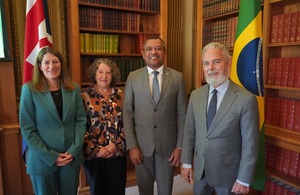
The UK and Brazil have signed a new agreement aimed at reducing the environmental footprint of fertilisers while unlocking new economic opportunities in agriculture.
The partnership was formalised in a meeting led by Ruth Davis, the UK’s Special Representative for Nature, and Cleber Oliveira Soares, Brazil’s Deputy Minister of Agriculture. Together, they committed to exploring ways to make fertiliser production and use more sustainable and efficient.
Key areas of focus include:
- Protecting biodiversity and reducing greenhouse gas emissions
- Building stronger, more resilient fertiliser supply chains
- Expanding collaboration on research, innovation, and sharing best practices
This agreement highlights both countries’ commitment to showing global leadership in sustainable agriculture. It also builds momentum ahead of COP30, where governments and international organisations are expected to step up cooperation on fertiliser sustainability.
Although fertilisers are essential to food production, their overuse is a major source of pollution and contributes to climate change—responsible for around 5% of global greenhouse gas emissions. By working together, the UK and Brazil aim to find smarter, cleaner, and more efficient ways to feed the world without harming the planet.
UK Special Representative for Nature, Ruth Davis said:
“Global cooperation is vital to restore the health of our soils, protect nature, and guarantee food systems for future generations. Fertilisers are crucial for our food security, so it is vital that their production and use evolves in line with today’s environment and climate challenges.
“Brazil, host of COP30 and one of the world’s most biodiverse nations, have set an important example on tackling this vital issue. Together, we can unlock innovation, improve nitrogen management, and build resilience across landscapes and livelihoods.”
Brazilian Deputy Agricultural Minister, Cleber Oliveira Soares said:
“For Brazil, advancing sustainable practices in the use of fertilizers means combining the strength of our agriculture with the responsibility to protect biodiversity and natural resources.
“The Ministry of Agriculture and Livestock has been investing in research, innovation, and international cooperation to ensure that food production grows in an increasingly sustainable and efficient way.
“This partnership with the United Kingdom reinforces Brazil’s commitment to promoting solutions that reconcile food security, resilient supply chains, and the climate urgency we all share.”
Brazilian Deputy Agricultural Minister, Marcel Moreira said:
“International cooperation on sustainability also strengthens the integration of Brazilian agribusiness into global markets.
“At the Secretariat of Trade and International Relations, we have been working to ensure that innovations in fertilizers and other agricultural inputs, as well as emission reduction efforts, translate into trade and partnership opportunities, reinforcing Brazil’s credibility and global position as a reliable supplier of safe, sustainable, and high-quality food.”







































